Filter by
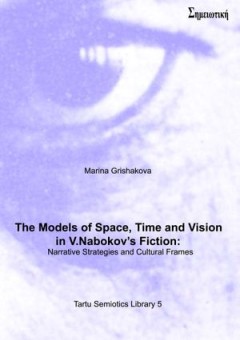
The Models of Space, Time and Vision in V. Nabokov’S Fiction: Narrative Str…
Marina Grishakova belongs to the younger generation scholars of the Tartu-Moscow school of semiotics. Her book is part of a semio-narratological tradition of a single author or a single work research that tackles issues of wider theoretical import: applicability of the concept of “modeling” in the humanities, theory of mimesis and the function of experimental literature in (post)modernist c…
- Edition
- -
- ISBN/ISSN
- 9789949320684
- Collation
- -
- Series Title
- -
- Call Number
- 791 GRI m
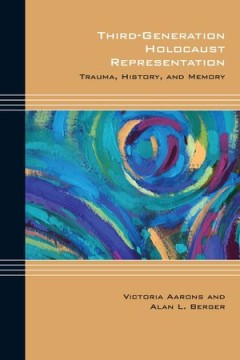
Third-Generation Holocaust Representation: Trauma, History, and Memory
Victoria Aarons and Alan L. Berger show that Holocaust literary representation has continued to flourish—gaining increased momentum even as its perspective shifts, as a third generation adds its voice to the chorus of post-Holocaust writers. In negotiating the complex thematic imperatives and narrative conceits of the literature of these writers, this bold new work examines those structu…
- Edition
- -
- ISBN/ISSN
- 9780810134102
- Collation
- -
- Series Title
- -
- Call Number
- -
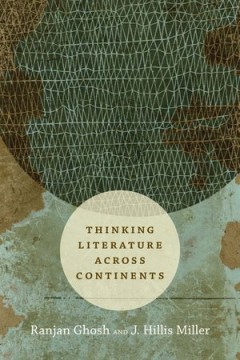
Thinking Literature across Continents
Thinking Literature across Continents finds Ranjan Ghosh and J. Hillis Miller— two thinkers from different continents, cultures, training, and critical perspectives— debating and reflecting upon what literature is and why it matters. Ghosh and Miller do not attempt to formulate a joint theory of literature; rather, they allow their different backgrounds and lively disagreements to stimulate…
- Edition
- -
- ISBN/ISSN
- 9780822361541
- Collation
- -
- Series Title
- -
- Call Number
- -
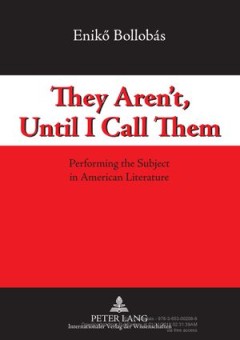
They Aren’t, Until I Call Them
In the story of the three baseball umpires, two novice umpires compete in boasting how they respect «truth» and the way things «really» are. One says, «I call them the way I see them»; the other, trying to trump this remark, responds, «I call them the way they are». Then enters the third, most seasoned umpire, saying, «They aren’t, until I call them». This book deals with two widel…
- Edition
- -
- ISBN/ISSN
- 9783631589823
- Collation
- -
- Series Title
- -
- Call Number
- -
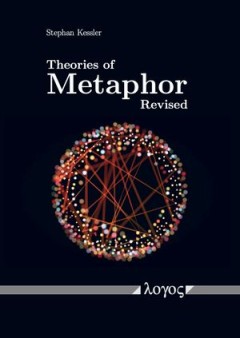
Theories of Metaphor Revised: Against a Cognitive Theory of Metaphor: An Apol…
Research that deals with metaphors and linguistic imagery has increased in the last thirty years. However, studies that question existing theories of metaphor from a comparative perspective are less common. The reason for the present theoretical sketch was the metaphorical model of conceptualism, alias the cognitive theory of metaphor: at least with this theory, `metaphor' itself has become a m…
- Edition
- -
- ISBN/ISSN
- 9783832547011
- Collation
- -
- Series Title
- -
- Call Number
- -
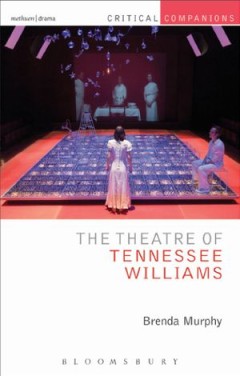
The Theatre of Tennessee Williams
In Brenda Murphy's major study of his work she examines Williams' life and career and provides an analysis of more than a score of his key plays, including in-depth studies of major works such as A Streetcar Named Desire, The Glass Menagerie, Cat on a Hot Tin Roof and others. She traces the artist figure who features in many of Williams' plays to broaden the discussion beyond the normal referen…
- Edition
- -
- ISBN/ISSN
- 9781780930251
- Collation
- -
- Series Title
- -
- Call Number
- -
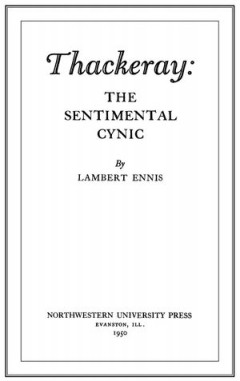
Thackeray: The Sentimental Cynic
Thackeray: The Sentimental Cynic chronicles British novelist William Thackeray’s ambivalent attitudes toward society and traces his conduct during the major crises of his life in terms of those attitudes. Lambert Ennis examines the emotional tensions in Thackeray’s life and the impact they had in his work. In so doing, he illustrates key themes in Victorian studies more broadly: the questio…
- Edition
- -
- ISBN/ISSN
- 9780810138377
- Collation
- -
- Series Title
- -
- Call Number
- -
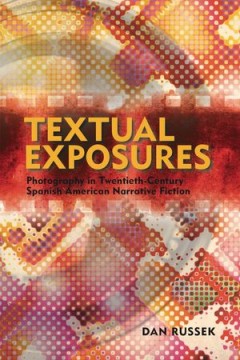
Textual Exposures: Photography in Twentieth Century Spanish American Narrativ…
This book examines how twentieth-century Spanish American literature has registered photography’s powers and limitations, and the creative ways in which writers of this region of the Americas have elaborated in fictional form the conventions and assumptions of this medium. While the book is essentially a study of literary criticism, it also aims to show how texts critically reflect upon the m…
- Edition
- -
- ISBN/ISSN
- 9781552387849
- Collation
- -
- Series Title
- -
- Call Number
- -
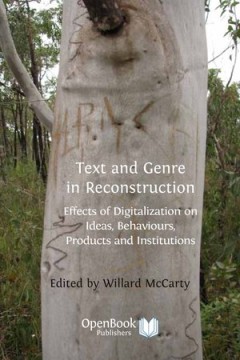
Text and Genre in Reconstruction: Effects of Digitalization on Ideas, Behavio…
this broad-reaching, multi-disciplinary collection, leading scholars investigate how the digital medium has altered the way we read and write text. In doing so, it challenges the very notion of scholarship as it has traditionally been imagined. Incorporating scientific, socio-historical, materialist and theoretical approaches, this rich body of work explores topics ranging from how computers ha…
- Edition
- -
- ISBN/ISSN
- 9781906924263
- Collation
- -
- Series Title
- -
- Call Number
- -
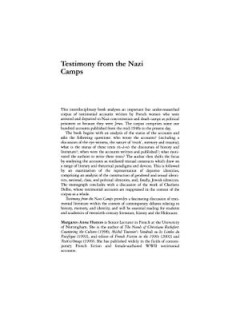
Testimony from the Nazi Camps
This interdisciplinary study intergrates historiographical, literary and cultural methodologies in its focus on a little known corpus of testimonial accounts published by French women deported to Nazi camps. Comprising epistemological and literary analyses of the accounts and an examination of the construction of deportee identities, it will interest those working in the fields of modern French…
- Edition
- -
- ISBN/ISSN
- 9780203339787
- Collation
- -
- Series Title
- -
- Call Number
- -
 Computer Science, Information & General Works
Computer Science, Information & General Works  Philosophy & Psychology
Philosophy & Psychology  Religion
Religion  Social Sciences
Social Sciences  Language
Language  Pure Science
Pure Science  Applied Sciences
Applied Sciences  Art & Recreation
Art & Recreation  Literature
Literature  History & Geography
History & Geography